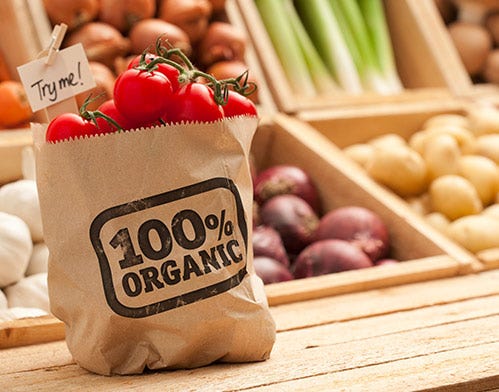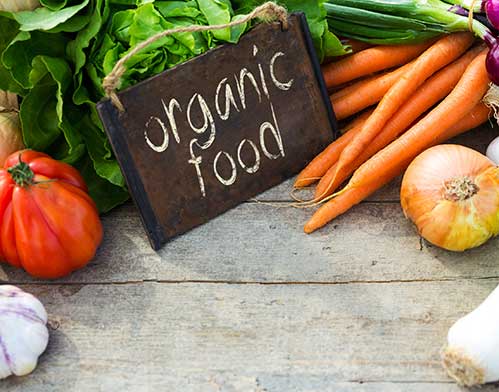Top 10 Reasons to Go Organic
- 2/1/17

Every day we make many decisions, but some may have a greater impact than we initially realize. For instance, when faced with a conventional or organic option, which one do you choose? Forty-five percent of Americans choose organic, according to a recent Gallup poll. While organic foods may come with a higher cost, the health benefits and environmental benefits may outweigh the downside of a greater price. From produce to supplements, the “USDA Organic” icon can make a big difference in overall well-being, along with other far-reaching impacts.
- Deal with Dirt, Not Chemicals. Of course, thoroughly washing food can remove traces of dirt. However, washing is not enough to remove some waxy residues and infiltration of pesticides that have leeched into foods from the soil. Conventional farming using synthetic pesticides have been shown in numerous reports, including the US National Library of Medicine, to be linked to many chronic health conditions with long-term exposure. These include but are not limited to ADHD, respiratory problems, certain cancers and immune system damage.
- Say No to GMOs. Genetically modified organisms make up over 90% of the most common crops in the US today, according to the Center for Food Safety. It’s no secret that avoiding GMOs has been a hot topic over the last few years as research points to its potential harmful effects. Buying USDA Organic, and also Non-GMO Project Verified foods and supplements will ensure the avoidance of GMOs.
- It’s More Nutritionally Sound. While many may think eating an orange delivers the same amount of nutrients whether organic or conventional, a University of Missouri study found that organic oranges delivered 30% more vitamin C. Other studies found similar results, including one published in the British Journal of Nutrition, which found that organics contain 18 to 69 percent higher concentrations of antioxidants. This may be because insecticides, herbicides and fungicides actually block a plant's ability to manufacture phytonutrients, such as polyphenols and antioxidants, according to Organic.org.
- Better Taste. As a result of higher antioxidants, organic foods were found to have a more intense flavor, according to the same British Journal of Nutrition study which measured nutritional value. Higher levels of synthetic fertilizers in conventional farming compromise soil quality, stressing the plant and ultimately impacting its taste.
- Avoid Unnecessary Hormones. Common diet staples like meat, milk and eggs often contain excessive growth hormones. The National Organic Program (NOP) rule prohibits the use of synthetic animal drugs.
- Promote Humane Treatment of Animals. The majority of conventional livestock lives in inhumane, confined conditions and are pumped with synthetic hormones to increase production. These stressful, unnatural conditions cause a serious decline in the animal’s health and quality of life. By National Organic Program (NOP) standards, organically raised animals must have access to the outdoors as well as have ample space to behave naturally.
- Safer, More Effective Supplementation. Just as it is important to make wise food choices, considering natural supplements is also imperative, experts suggest. If not organic, supplements can contain inactive synthetic binder and filler ingredients which can cause decreased absorption or even allergic reactions.
- It Helps Preserve Ecosystems. Organic farming helps support eco-sustenance, mainly by preservation of soil and crop rotation. According to research from the New York Academy of Sciences, organic farming seems to also enhance species richness, particularly where the surrounding landscape impacts biodiversity or ecosystem services versus conventional farms.
- Avoid Endocrine Disruptors. The skin is the body’s biggest organ, so it makes sense to consider organic topical products such as cosmetics and personal care products as well. The FDA does not regulate cosmetics like it does drugs and biologics. As a result, many harmful ingredients known to be endocrine disruptors, such as phthalates, are a part of commonly applied products.
- It’s Healthier for Pets, Too. According to PetMD, pets too can benefit from organic foods. Feeding your pet foods that are free of potential carcinogens reduces the risk of adverse reactions. Higher quality protein sources means no harmful fillers or inferior by-products, thereby offering more solid nutritional benefits. Organic foods will also eliminate "empty" calories from additives and flavorings that can contribute to pet obesity, a known contributor to ill health in pets.




